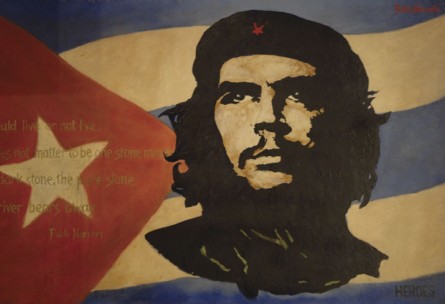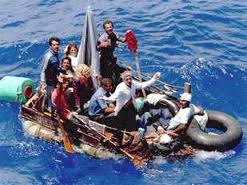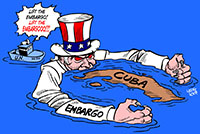 This is the first of my three part series on traveling to Cuba.
This is the first of my three part series on traveling to Cuba.
» Part 1: History & Why You Need to Go
» Part 2: Getting There By Any Means Necessary
» Part 3: Through My Own Eyes
Part One of the series focuses on the history of the embargo, how the embargo is portrayed in the US and my opinions on why every American should visit the island. Part Two will focus on the number of ways a US citizen can visit Cuba and a few tips on what to expect once you arrive. Finally, Part Three details my personal experience on the island in the familiar trip review format – including pictures and video.
Each part of the series will include several facts, my interpretations of those facts and my personal opinions. I am not advocating a particular governmental or economic philosophy nor am I assigning ‘Good Guy/Bad Guy’ status to any of the players; my only goal is to encourage critical thinking of my readers so that they may form their own opinions. To that end, I am completely upfront and unabashed about advocating that US citizens visit the island prior to the embargo being lifted. On to Part 1: History and the Need to Go…
Brief History of Embargo
I was amazed at the wildly varied responses I got when I uttered the phase ‘I’m going to Cuba”. I heard everything from “Don’t they hate us?”, “dude, that’s awesome!”, “you can’t support that evil empire?” to “why do you want to go there?” – just to name a few. The most common response though was “isn’t that illegal?” The takeaway for me is even after being in place for over 50 years, the US/Cuban relationship is still shrouded in mystery and perhaps more importantly propaganda from both sides. To that end, a think a brief timeline of the US’ Cuban embargo is in order.
| Cuban Embargo Timeline | |
|
≤ 1959
|
US government lackey and Mob business partner President Batista rules Cuba. Significant disparity between rich (~5%) and poor (~95%) exists. |
|
1959
|
Fidel Castro, his brother Raul and Ernesto ‘Che’ Guevara lead a guerrilla army that overthrows the Batista regime. Fidel Castro eventually becomes President. |
|
1960
|
Revised Cuban constitution bans (among other things) casinos, prostitution and racism. Cuban government nationalizes all US owned businesses without compensation. US breaks off diplomatic relations with Cuba and imposes a trade embargo. Cubans with financial means flee to Florida, others who were perceived Batista benefactors were jailed and/or executed. |
|
1961
|
US CIA & Cuban exiles attempt a failed coup known as “the Bay of Pigs”; Castro proclaims Cuba a socialist state and allies it with the communist USSR. |
|
1962
|
Cuban missile crisis ignites when, fearing a US invasion, Castro agrees to allow the USSR to deploy nuclear missiles on the island. War is avoided when the USSR agrees to remove its missiles and US agrees to remove its missiles from Turkey, as well as promises never to invade Cuba. |
|
1990
|
Soviet Union collapses; Cuba loses major trade partner and economy goes into a tailspin. |
|
1996
|
Helms-Burton Act further restricts United States citizens (natural born & residents) from doing business or spending money in or with Cuba. |
|
1999
|
US expands trade embargo even further making it illegal for foreign subsidiaries of U.S. companies to do business with Cuba. |
The ‘Economic’ embargo applies to all US government agencies, businesses, its foreign subsidiaries and any individual living in the US, including natural born citizens, naturalized citizens (even those with dual-citizenship) and legal residents. Technically, it is not illegal to visit Cuba – it is illegal to contribute to the Cuban economy in any way. Whatever amount spent on plane tickets, gas for a boat, food, hotel – whatever, contributes to the Cuban economy and therefore violates the embargo.
US/Cuban Propaganda Relations
Because it is fairly difficult for US citizens to travel to Cuba and we are not privy to much if any of their locally produced news content, the US public is left with information that is filtered, massaged and/or manipulated to advocate a particular cause. If all you knew about Cuba was the media’s and the US politician’s depiction of the country, it would be difficult to think of it as more than a nation of people virtually imprisoned by an evil dictator, living in poverty/dilapidated conditions and resorting to elicit enterprises just to get by.
Let’s provide a little reality shall we; from no less than the US government. According to the CIA’s World Fact Book, Cuba has an Adult Literacy Rate of 99.8% (that’s 2nd highest in the world). The unemployment rate in Cuba is 1.7%*** (8th in the World). Though it’s hard to find official numbers for Cuba’s homeless rate, it is generally accepted as the lowest in this hemisphere since housing is guaranteed in the country’s constitution (note: there is homelessness in Cuba, it’s just significantly less than other countries). And let’s not forget healthcare is free and guaranteed for every citizen in the country. Cuba has the largest economy, GDP and population in all of the Caribbean and Latin America dwarfing Jamaica, Costa Rica and the Bahamas combined. To sum it up, in Cuba you are very likely to be well educated, have a job, access to free healthcare, food to eat (state rationed) and a place to sleep – something an alarming number of Americans cannot claim.
 Another media fallacy is ‘everyone’ in Cuba is waiting for the next cardboard box to float by to risk their lives navigating the Atlantic Ocean in hopes of reaching Florida’s “freedom”. While it is certainly true many Cubans have lost their lives attempting this, the numbers aren’t even close to the thousands of Mexicans to have died attempting to cross the desert and/or the Rio Grande. The coverage of these two events is disproportionally skewed towards the relatively few Cubans who have tried and failed. The fact is many more Mexicans die in a week than Cubans have died in the last year attempting to get into the US. Think about this for a second; the immigration issue is generally framed as Mexicans taking jobs (jobs some say no American wants) and living off of social services without paying for them. What if we allowed immigration of the most educated country in this hemisphere and they began taking the white collar jobs we do want?? Food for thought, but I digress.
Another media fallacy is ‘everyone’ in Cuba is waiting for the next cardboard box to float by to risk their lives navigating the Atlantic Ocean in hopes of reaching Florida’s “freedom”. While it is certainly true many Cubans have lost their lives attempting this, the numbers aren’t even close to the thousands of Mexicans to have died attempting to cross the desert and/or the Rio Grande. The coverage of these two events is disproportionally skewed towards the relatively few Cubans who have tried and failed. The fact is many more Mexicans die in a week than Cubans have died in the last year attempting to get into the US. Think about this for a second; the immigration issue is generally framed as Mexicans taking jobs (jobs some say no American wants) and living off of social services without paying for them. What if we allowed immigration of the most educated country in this hemisphere and they began taking the white collar jobs we do want?? Food for thought, but I digress.
Speaking of out of whack, former Cuban exiles living in Tampa and South Florida have a disproportionate impact on our immigration policy and national politics. Many national elections have been swayed by the Cuban American constituency which represents less the 1% of the US population.  I suspect you remember the Elan Gonzolas debacle; at the core of the entire episode is the “Wet Foot, Dry Foot” policy. The short version of this immigration law is Cubans who successfully put their feet on dry land of any US territory are automatically granted asylum and US Citizenship. Cubans who are captured at sea (Wet Foot) are returned to Cuba. Seriously, I couldn’t make this bullshit up. When I lived in Miami, I would often pass one of the US immigration offices that had giant outdoor fenced prisons full of black people. Primarily from Haiti or Jamaica, these folks were denied economic asylum and were awaiting deportation back to their country. So, for no other country in the world do we allow someone to magically become a citizen by – breaking the law no less – like we do for Cubans; but Haitians – who were trying to escape the very definition of economic hardship before the earthquake – are herded into awful makeshift prisons while awaiting the boot out of the country. There’s no other word for it – Bullshit!
I suspect you remember the Elan Gonzolas debacle; at the core of the entire episode is the “Wet Foot, Dry Foot” policy. The short version of this immigration law is Cubans who successfully put their feet on dry land of any US territory are automatically granted asylum and US Citizenship. Cubans who are captured at sea (Wet Foot) are returned to Cuba. Seriously, I couldn’t make this bullshit up. When I lived in Miami, I would often pass one of the US immigration offices that had giant outdoor fenced prisons full of black people. Primarily from Haiti or Jamaica, these folks were denied economic asylum and were awaiting deportation back to their country. So, for no other country in the world do we allow someone to magically become a citizen by – breaking the law no less – like we do for Cubans; but Haitians – who were trying to escape the very definition of economic hardship before the earthquake – are herded into awful makeshift prisons while awaiting the boot out of the country. There’s no other word for it – Bullshit!
Finally, the embargo is frequently justified as “we shouldn’t do business with evil people”. Of course this is the height of hypocrisy as the US does business with evil regimes every single day. This issue is more accurately described as “the US shouldn’t do business with evil people it doesn’t need anything from”. Saudi Arabia has a flat out awful human rights record and most of the 9/11 hijackers were from its borders. But we need oil – thus we do business. Don’t get me started on India’s near slavery, US’ support of Apartheid and Saddam Hussein as an ‘ally’ right until the point he messed with Kuwait’s oil. We don’t do business with Cuba because we don’t need anything from them – pure and simple. We can get Cuba’s primary exports – sugar, rum and cigars – from several other regions around the globe (at least “good enough cigars”).
Why I Think You Should Go
I’d like you to think about the following as your read through the remainder of this series. The United States has implemented sanctions/embargos against 15 countries and/or regions (mostly terrorist states) and of the 15 countries on that list, Cuba is the only one US citizens cannot travel to. That’s right – if you wanted to, you could travel to Iran, Somalia, and North Korea – but Cuba is just too evil for the average American to stomach.
 As stated by the US government, the embargo was supposed to make the Cuban population rise up and throw the Castros out of office. Whether you think the embargo was/is a good idea or not, I think we can all agree that it’s not working. Fidel Castro has outlasted 10 US presidents and is working on number 11 – that’s 50 years!!! The end result is the government still rules and the people are paying the price due to the country’s inability to trade with the largest economy in the world. Eventually the embargo will be lifted; likely coinciding with the death of the original “el Presidente” Fidel Castro. After all, he is 84 years old and the only thing the US has to gain is the symbolic victory of outlasting the constant thorn in its side sitting only 90 miles from Florida.
As stated by the US government, the embargo was supposed to make the Cuban population rise up and throw the Castros out of office. Whether you think the embargo was/is a good idea or not, I think we can all agree that it’s not working. Fidel Castro has outlasted 10 US presidents and is working on number 11 – that’s 50 years!!! The end result is the government still rules and the people are paying the price due to the country’s inability to trade with the largest economy in the world. Eventually the embargo will be lifted; likely coinciding with the death of the original “el Presidente” Fidel Castro. After all, he is 84 years old and the only thing the US has to gain is the symbolic victory of outlasting the constant thorn in its side sitting only 90 miles from Florida.
The two primary reasons I believe every American should visit Cuba prior to the embargo being lifted are:
- In order to make an informed decision (e.g. vote) on the issues like Trade Agreements, Health Care and Immigration Reforms that are currently affecting our country – it may be helpful to know a little about these subjects. All of these issues will play a prominent role in US politics in the near future – particularly as the “Socialist” rhetoric starts to increase as we get closer to the ‘political silly season’. One way of acquiring knowledge on these issues is to actually travel to a real Socialist country and formulate your own opinions. The reality is if you rely on others to tell you what to think on these matters you can’t blame anyone else for your ignorance or the likelihood you will be manipulated into voting against your own interests.
- These sanctions are being imposed in your name. As a US citizen you pay taxes and have the right to know how your government is spending that money – whether it is on the battlefield, diplomatic table or an economic sanction. Furthermore, the specific travel ban is illogical and possibly unconstitutional; restricting citizen’s right to travel to single country on the planet is as un-American as apple pie. The point isn’t whether the embargo is good or bad – it’s whether you should be able to see the results of your government’s actions for yourself.
While those are my two primary reasons, I would be remiss if I painted the picture that the only reason to go to Cuba is for some sort of political science exercise. Havana is a beautiful place full of culture and some of the most pleasant people you’ll ever meet. It’s just that due to the complexity and expense involved, tourism may not be a good enough reason to go by itself. Of course that’s just my opinion – you should formulate your own so long as you don’t approach this voyeuristically or as some sort of Slum Tourism escapade.
Final Thoughts
 If it sounds like this article is painting a somewhat unflattering picture of US policy, you would be correct – it does. This part of the series shouldn’t be taken as me promoting the Cuban government in any form or fashion. Make no mistake about it, much of the ill will towards Castro both in and outside of Cuba are of his own making. There are two sides to every coin and I will speak to some of the things I witnessed while in Havana in Part 3, including what felt like an open air prison for the Cuban population, their inability speak and move freely, the secret police, the fact that some Cubans are more ‘equal’ than others, rampant underground black market/prostitution and Cuba’s very own propaganda machine.
If it sounds like this article is painting a somewhat unflattering picture of US policy, you would be correct – it does. This part of the series shouldn’t be taken as me promoting the Cuban government in any form or fashion. Make no mistake about it, much of the ill will towards Castro both in and outside of Cuba are of his own making. There are two sides to every coin and I will speak to some of the things I witnessed while in Havana in Part 3, including what felt like an open air prison for the Cuban population, their inability speak and move freely, the secret police, the fact that some Cubans are more ‘equal’ than others, rampant underground black market/prostitution and Cuba’s very own propaganda machine.
That said, at best much of the US media’s coverage of the Cuba issue is very one sided; at worst utter propaganda. Unlike in the movies, there aren’t any well defined ‘good’ or ‘bad’ guys – no one is innocent in this 50 year old stalemate. What seems clear is the embargo hasn’t destroyed the Castros and the Cuban people are paying the price.
Perhaps the most important advice I can give is for you to decide for yourself. Don’t let anyone else unduly influence your opinion on this subject – whether the US media, politicians, the Cuban propaganda machine or opinionated bloggers (present company included). The ability to gain insight on how these issues impact your life and to understand the effects of what your government is doing in your name are available once you decide to visit the forbidden land.
Next: Cuba: Part 2 – Getting There By Any Means Necessary
*** In September 2010, the Cuban government announced it was laying off over 500,000 government workers; a figure sure to make 2009’s 1.7% unemployment rate skyrocket.














